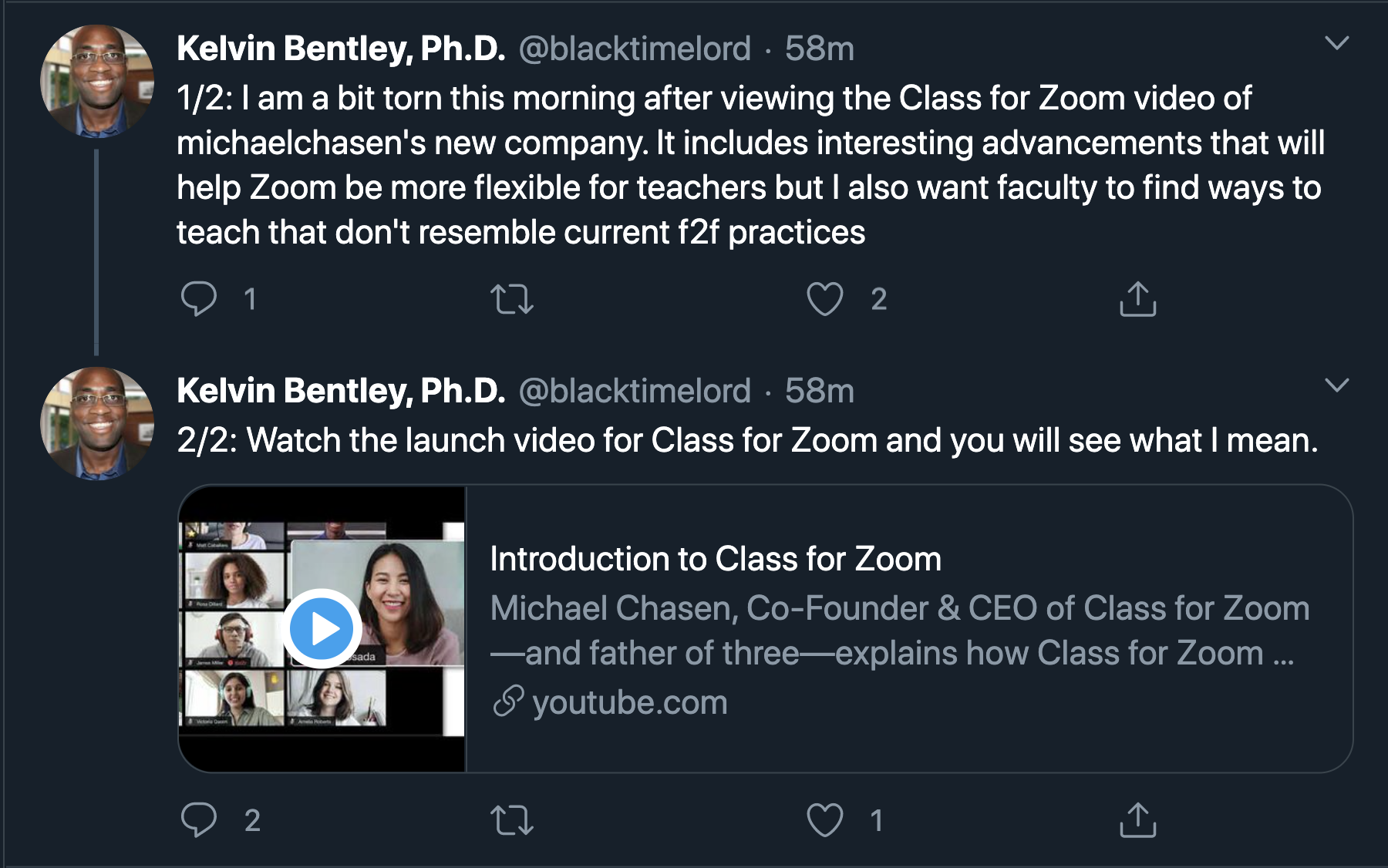You have /5 articles left.
Sign up for a free account or log in.
A video of Class for Zoom from ClassEdu scrolled across my Twitter feed today. Thanks, Kelvin Bentley!

The 6:51 demo is well worth a watch. I'll even embed it below.
What to make of Class for Zoom for higher ed?
First, it's great to see Michael Chasen again. There will be many of us who got to know him over the years that he led Blackboard, a company he co-founded in 1997. Back in 2012, when Chasen left the CEO role at Blackboard, I wrote:
I think we should take a moment to acknowledge the role that Michael Chasen has played over the past 15 years as a founder and CEO of Blackboard in changing our edtech industry.
Many will disagree with me, but I believe that Blackboard has been part of accelerating a transition to active learning at scale, and the growth of the LMS industry has made possible the rapid diffusion of blended and online learning.
Michael Chasen's role in bringing both capital and consolidation to an underfunded and fragmented edtech industry should not be minimized.
I hope that our community joins me in wishing him well as he transitions out of Blackboard and embarks on his next adventure - I suspect that there are a few more edtech companies that Michael Chasen is yet to build.
In my 2013 piece called "33 Signs You Are an EdTech Nerd," item No. 10 was: "You are depressed that you will no longer get to dance with Michael Chasen at Blackboard World."
So while it will be important to separate Class for Zoom from ClassEdu's co-founder and CEO, I also want to acknowledge what a small world that ed tech really is.
Anyway, what to make of Class for Zoom?
I have some initial thoughts, but since I have not spoken to anyone at this new ed-tech start-up or laid hand on the platform, my reactions are only speculative.
First, it seems as if Class for Zoom is going for all of education, from primary to postsecondary. That is fine, as Zoom is being used all over education during the pandemic. However, I do wonder if it is possible to build an educational platform on and around Zoom that works for both second and 13th graders? Maybe. I don't know.
Will ClassEdu have the bandwidth to work with both K-12 and colleges and universities? If I were ClassEdu, I might focus on selling to entire school districts -- rather than messing with individual colleges and universities. So I do worry that without a dedicated higher ed team, the needs of higher education may not take top priority.
Beyond that concern, I share Bentley's reaction of wanting "faculty to find ways to teach that don't resemble current [face-to-face] practices."
The last thing we need nowadays is college students spending more time in Zoom. Synchronous online platforms should be used to complement robust asynchronously designed courses. Online meetings platforms such as Zoom can be great for coaching and conversations but should never be used to transmit information. (And never ever should be used for evaluative purposes).
For higher education, the limitations and simplicity of Zoom should be thought of as a feature, not a bug.
Effective pedagogy translates into judicious and targeted uses of Zoom. From a learning standpoint, the changes we need in Zoom are more behavioral than technological.
For instance, we need to convince professors not to require students to turn on their cameras. To hold shorter class sessions. To not cold-call students. To distribute the conversation across all participants. And to give up on the expectations that every student will have privacy, space or bandwidth to participate in a synchronous Zoom session.
In evaluating Class for Zoom -- and I think we should try to get in on the platform's beta -- we should keep top of mind how Zoom should be used as a tool to advance learning.
Will you be checking out Class for Zoom?








